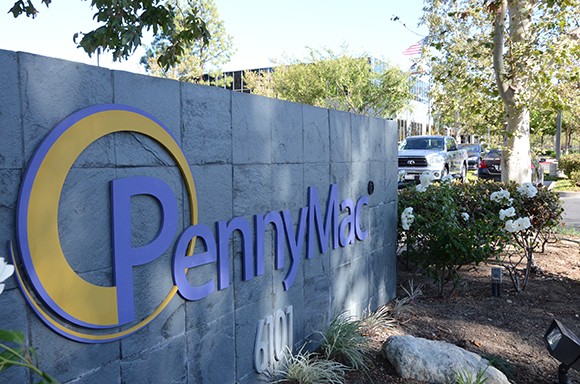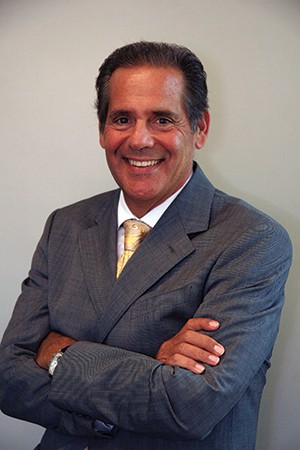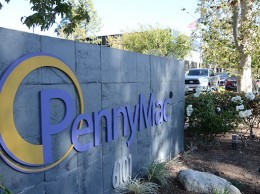PennyMac counts on family, Countrywide ties
IN THIS ARTICLE
- Banking & Finance Topic
- Elijah Brumback and Marlize van Romburgh Author
By Elijah Brumback and Marlize van Romburgh Friday, July 18th, 2014

PennyMac’s headquarters at 6101 Condor Drive in Moorpark. (Austen Hufford / Business Times photo)
PennyMac, the Moorpark-based firm founded by former top brass at Countrywide Financial Corp., has inked a $550 million loan repurchasing deal with Bank of America.
The deal forms a half-billion-dollar pact among three companies that have been intimately connected since shortly after Countrywide, the firm at the heart of the subprime loan meltdown, was sold to Bank of America in 2008.
Under the terms of the July 14 deal, a subsidiary of PennyMac’s mortgage trust will sell newly originated home loans to Bank of America, with the Moorpark firm potentially repurchasing them later.
The transaction highlights a set of companies whose management and businesses are so thoroughly intertwined that regulators have questioned ties to Countrywide and some investors have objected to executive pay.
On paper, PennyMac is two companies packed with former Countrywide staff. But the PennyMac firms do business heavily with each other, and the largest single repurchase agreement so far is with Bank of America, where Countrywide’s assets landed after it teetered on the brink of failure.
The overlapping ties at PennyMac range from the company’s highest levels all the way down to its cafeteria. John Taylor, who also serves as a director at Wilshire Bancorp, recently resigned from the board of directors at PennyMac Financial Services to maintain compliance with a 1978 law aimed at preventing interlocks among executives at banking firms. And PennyMac’s cafeteria is run rent-free through a contract with CEO Standford Kurland’s daughter and the wife of another company executive.
Two firms, one business

PennyMac CEO and Chairman Stanford Kurland, formerly of Countrywide Financial Corp. (PennyMac handout photo)
PennyMac Mortgage Investment Trust is a real estate investment trust, or REIT. The company buys troubled loans from banks, often for pennies on the dollar, and tries to make a profit on them either by working with homeowners on alternatives to foreclosure or securitizing the loans and selling them. It also buys newly originated mortgages from correspondent lenders. It went public in 2009, shortly after the Countrywide sale to Bank of America, and now has a market capitalization of $1.6 billion.
Its sister firm, PennyMac Financial, is run by the same CEO and chairman and acts as an outside investment manager for the REIT, from which it collects fees.
CEO Kurland’s 11 percent voting stake in PennyMac Financial has raised questions about potential conflicts of interest and his fiduciary duties to investors in the REIT. What isn’t in doubt is Kurland’s success at building out two hugely profitable mortgage ventures.
The PennyMac REIT earned $200.2 million on $405.5 million in net investment income in 2013, marking a 45 percent profit gain over 2012.
PennyMac Financial, which shares an executive team, chairman and headquarters building with the trust, has a market capitalization of $326 million after going public last year. The financial services firm notched a $172.2 million profit in 2013, up 45 percent over the previous year. About one-third of PennyMac Financial’s $386.6 million in revenue last year came from fulfillment and loan-servicing fees charges to the REIT.
The Kurland family is the third-largest controlling shareholder in PennyMac Financial, just after Wall Street giant BlackRock and Boston-based HC Partners. Billionaire hedge fund manager Leon Cooperman is also a major investor.
Both PennyMac firms were founded by Kurland, the former president at Countrywide Financial, the largest subprime home lender in the U.S. until its near-collapse in 2008. Kurland received more than $8 million in total compensation between the two PennyMac jobs last year.
In addressing questions about Kurland’s dual roles and his fiduciary duties at the two firms, the REIT has said it believes it “has in place the proper agreements, controls and oversight to mitigate potential conflicts in its relationship” with the financial services firm.
The Securities and Exchange Commission, in a letter to the financial services company after it announced plans to go public last year, probed the firm on Kurland’s former high-profile role. “We note your disclosure regarding the advantages of your seasoned management team, including your CEO who was previously president, CFO, and COO of Countrywide Financial Corp., and several other former senior managers of Countrywide,” regulators said in a March 2013 letter to the company’s legal team. “Please tell us what consideration you have given to including a risk factor that addresses the failures of Countrywide while under the management of these individuals, including but not limited to recent and ongoing litigation.”
Major employers
The PennyMac firms are run out of the same building on Condor Drive in Moorpark, not far from the former Countrywide headquarters in Calabasas.
In just a few years, PennyMac Financial Services has hired more than 1,000 corporate employees, making it the largest employer in Moorpark, a city in East Ventura County that has long been a financial services hub.
Deep-rooted connections run between PennyMac, Bank of America, Countrywide and some of Wall Street’s largest players. PennyMac Mortgage and PennyMac Financial share the same set of 10 executives, seven of whom hail from Countrywide. Four have also worked for Bank of America, and two were previously at BlackRock, the New York firm that owns a 22 percent voting stake in PennyMac Financial Services.
The PennyMac firms have cautioned investors that their Countrywide roots could come back to haunt them. In the financial services firm’s annual statement, it warns of the “potential damage to our reputation and adverse impact to our business resulting from the ongoing negative publicity focused on Countrywide Financial Corp., given the former association of certain of our officers with that entity.”
Countrywide became the largest U.S. home lender in part by offering complicated subprime mortgages to people with the weakest credit. Losses on troubled loans drove the firm to the brink of failure until Bank of America purchased the firm for $2.8 billion in 2008, a deal widely viewed as a forced marriage prompted by regulators. Bank of America has since absorbed tens of billions of dollars in costs related to the Countrywide rescue.
In a 2010 settlement with SEC, Countrywide founder and former CEO Angelo Mozilo paid a $67.5 million fine and agreed to a lifetime ban prohibiting him from serving as an executive or director of a publicly traded company. The deal with securities regulators settled wide-ranging charges that Mozilo had misled investors, engaged in insider trading and profited from “ill-gotten gains.”
Kurland, who has never faced any regulatory action for his role at Countrywide, served more than two decades with the mortgage giant until his departure in 2006, when he cashed out more than $200 million in stock.
Me N U, and Kurland too
A closer look at the Moorpark firms’ regulatory filings reveals close relationships between several of the companies’ top leaders. PennyMac Financial Services employs Kurland’s brother-in-law, Robert Schreibman, as its senior vice president of asset management, a role in which he received a base salary of $242,288 last year.
The brother of Chief Investment Officer Vandad Fartaj is also a high-profile employee of the firm. In his role as PennyMac Financial’s senior vice president for mortgage trading, Vala Fartaj receives a base salary and bonus of $328,152.
And for lunch, Kurland can stroll down to the company cafeteria, which is operated by Me N U Kitchen. The food service business is co-owned by his daughter, Ashley Rubinstein, and Marci Grogin, the wife of PennyMac Chief Administrative and Legal Officer Jeffrey Grogin. Me N U operates the eatery rent-free, regulatory filings show, and PennyMac covered more than $150,000 of its operating costs last year.
[Correction, July 21, 2014: The July 18 story about PennyMac did not clearly state that the company’s largest repurchase agreement is with Bank of America; in addition, investors have objected to executive pay, not Countrywide ties. John Taylor, a director at Wilshire Bancorp, resigned from the board of PennyMac Financial Services, the company that has become the largest employer in Moorpark. Two members of the executive team shared by the firms served previously at BlackRock. The voting interests of Blackrock and Stanford Kurland in PennyMac Financial Services are 22 percent and 11 percent, respectively, which differs from their reported beneficial ownership of Class A common stock because of a dual-class share structure. When the Business Times contacted the PennyMac firms for the story, it did not seek comment on these items.]










